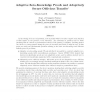Free Online Productivity Tools
i2Speak
i2Symbol
i2OCR
iTex2Img
iWeb2Print
iWeb2Shot
i2Type
iPdf2Split
iPdf2Merge
i2Bopomofo
i2Arabic
i2Style
i2Image
i2PDF
iLatex2Rtf
Sci2ools
126
click to vote
TCC
2009
Springer
2009
Springer
Adaptive Zero-Knowledge Proofs and Adaptively Secure Oblivious Transfer
In the setting of secure computation, a set of parties wish to securely compute some function of their inputs, in the presence of an adversary. The adversary in question may be static (meaning that it controls a predetermined subset of the parties) or adaptive (meaning that it can choose to corrupt parties during the protocol execution and based on what it sees). In this paper, we study two fundamental questions relating to the basic zero-knowledge and oblivious transfer protocol problems: ? Adaptive zero-knowledge proofs: We ask whether it is possible to construct adaptive zeroknowledge proofs (with unconditional soundness). Beaver (STOC 1996) showed that known zero-knowledge proofs are not adaptively secure, and in addition showed how to construct zero-knowledge arguments (with computational soundness). ? Adaptively secure oblivious transfer: All known protocols for adaptively secure oblivious transfer rely on seemingly stronger hardness assumptions than for the case of static adver...
Adaptive Zero-knowledge Proofs | Adaptive Zero-knowledge Protocols | Cryptography | Secure Oblivious Transfer | TCC 2009 |
Related Content
| Added | 25 Nov 2009 |
| Updated | 25 Nov 2009 |
| Type | Conference |
| Year | 2009 |
| Where | TCC |
| Authors | Yehuda Lindell, Hila Zarosim |
Comments (0)

